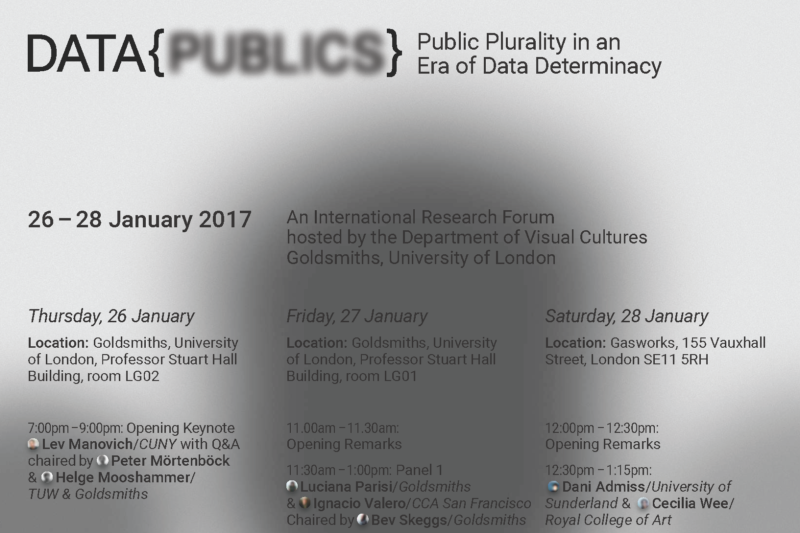- 11 June 2017
- By Tom Trevatt
- CRITICAL RESPONSES
- Data Publics
DATA {PUBLICS} – LONDON 2017
DATA {PUBLICS} International Research Forum, 26-28th January 2017 at Goldsmiths University, London and Gasworks Gallery was a three-day symposium that focused on the condition of living under continual and expansive data accumulation and surveillance, the shaping of data generated public spheres and the political implications of big data. Conceived by PETER MÖRTENBÖCK and HELGE MOOSHAMMER, the Forum forms part of an ongoing multi-year, multi-institution project that engages with the impact of a “data mentality” on the concepts of public and private space. Central to the three-day symposium was an understanding of data as a recursive category that articulates itself through multiple registers, agents and materials. We saw how data capture and analysis feeds back into everyday life, into political and police power, into the actions and behaviours, societal norms and habits of people globally. Indeed, some stand-out claims from the three days revolve around the capacity for data, be it images circulated on social media or messaging platforms, or information about climate and air quality, or the movement of financial transactions, to reflexively impact on the world in new and interesting ways.
The three days started at Goldsmiths with a packed out audience of 250 for LEV MANOVICH’s paper “how i edit my instagram”, which looked at the democratised cultural practices of a global population, and the emergent trends occurring on the picture sharing social media platform. This progressed the next day, also at Goldsmiths, to a full day of panels and discussions that took in contributions from multiple academics working in the field of data today, culminating in a keynote from RAVI SUNDARAM, dealing with the political implications of the online messaging platform WhatsApp in his native India. The third and final day saw a series of more intimate artists salons at Gasworks where the artists and curators discussed the cultural implications of data, how data can be, and is, utilised in their artistic practices and how we might understand the “image” of data.
The progression from LEV MANOVICH’s keynote on Thursday evening over the course of the three days took in a wide range of different engagements with the way data capture inflects our lives. MANOVICH’s appraisal of Instagram, the associated capitalisation on our information notwithstanding, was implicitly challenged by the likes of PAOLO GERBAUDO and RAVI SUNDARAM, whose critical contributions examined the utilisation of personal data and the uses of capturing technology through a frame that accounted for aggressive forms of capital accumulation. Data capture here, is seen as a form of primitive accumulation that must be resisted. Some of these resistance strategies emerged, especially with MATTHEW FULLER, whose understanding of the reflexivity inimical to data processing technologies mimics that of the political project of anarchism. How can plasticity be useful for a political project against data capture for capitalisation? JENNIFER GABRYS’ presentation asks how it could be possible to understand the capturing of data as a democratised project open to everyone. If the cost of the technology is reduced sufficiently, why should it only be large corporations that withdraw data, and thus value from us? Whilst Instagram involves the continual feeding of data into a corporation – which as MANOVICH suggests opens out the capacity for individuals to partake in an emergent process of cultural construction – could we reimagine the forms of these platforms through diffused ownership and responsibility? Thus, a project of data plasticity that enacts a broader conception of political agency to take in ownership/capture could be considered.
